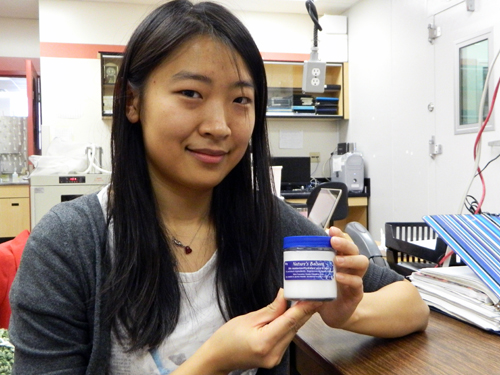
Read the label. That hand lotion you slather on your skin to relieve dryness caused by winter’s parched air may contain chemicals you’d rather not have absorbed into your body. A 2010 report by the David Suzuki Foundation found more than 80 per cent of the cosmetic items available in Canadian stores contained at least one of their “dirty dozen” most dangerous chemicals.
But what if you had a lotion that softened and moisturized your skin, didn’t feel greasy and was so safe you could eat it? Not that it’s tasty, but the ingredients are all food-based. If the work of food science master’s student Fan (Cendy) Wang and Prof. Alejandro Marangoni pans out, that lotion may be available in stores within the next few years. Other student researchers are working on lipsticks that pair staying power and texture with safe and healthy ingredients.
“Before I started this research, I rarely read cosmetic labels,” says Wang. “Now I do, and it’s shocking to see what ingredients are in some of the products. I don’t really wear make-up, but I use skin creams. Like everyone else, I like to have healthy-looking skin.”
The lotion she is developing uses food-grade oil that is processed into an emulsion with the oil encapsulated in water and scented with natural fragrances (lavender and sweet vanilla or orange citrus). The scent is important, Wang says, because the first thing most people do when she hands them a sample is to sniff it.
The end product is safe and appealing to the people who have tried it. It has a pleasant, non-greasy feel, it keeps skin soft for hours and the mild scent lasts a long time. “Everyone who tries it seems to love it,” Wang says.
The one drawback at this point is that it needs to be kept refrigerated; otherwise the emulsion of oil and water will begin to break down after a couple of months at room temperature. “It’s still safe from microbial growth,” says Wang, “but nobody wants to see drops of water coming out of their hand lotion.”
Kept in the fridge, the lotion will last for at least a year, “but people don’t usually store lotions in the fridge,” says Wang. “So I am working on finding ways to make this product stable at room temperature.”
Wang grew up in Beijing, China, and moved to Canada when she was 20 to start her undergrad studies at Dalhousie University. “I actually went to a top Chinese university and studied journalism for a year and a half, focused on broadcasting, before I came to Canada,” Wang explains. “I decided I wanted to do something new, and there are definitely more choices in Canada.”
After completing a B.A.Sc. in food science at Dalhousie and becoming interested in research, she came to U of G for graduate studies. “I study food science because it is a practical subject and related to everyday life. I chose to do the cosmetic research because I think having better skincare products is important. I am quite passionate about my research,” she says.